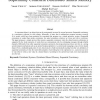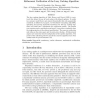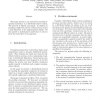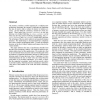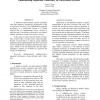149
click to vote
PLDI
2011
ACM
14 years 4 months ago
2011
ACM
Current proposals for concurrent shared-memory languages, including C++ and C, provide sequential consistency only for programs without data races (the DRF guarantee). While the i...
133
click to vote
CJ
2010
14 years 11 months ago
2010
A concurrent object is an object that can be concurrently accessed by several processes. Sequential consistency is a consistency criterion for such objects. Informally, it states ...
115
click to vote
ACTA
2006
15 years 2 months ago
2006
The lazy caching algorithm of Afek, Brown, and Merrit (1993) is a protocol that allows the use of local caches with delayed updates. It results in a memory model that is not atomi...
108
click to vote
CORR
2008
Springer
15 years 2 months ago
2008
Springer
We consider an untrusted server storing shared data on behalf of clients. We show that no storage access protocol can on the one hand preserve sequential consistency and wait-free...
126
click to vote
ISCAPDCS
2004
15 years 3 months ago
2004
This paper presents a new protocol for ensuring sequential consistency in a distributed objects system. The protocol is efficient and simple. In addition to providing a high-level...
129
click to vote
ASPLOS
1991
ACM
15 years 5 months ago
1991
ACM
The memory consistency model supported by a multiprocessor architecture determines the amount of buffering and pipelining that may be used to hide or reduce the latency of memory ...
118
click to vote
CAV
2004
Springer
15 years 5 months ago
2004
Springer
Sequential consistency is the archetypal correctness condition for the memory protocols of shared-memory multiprocessors. Typically, such protocols are parameterized by the number ...
118
click to vote
ICPP
1990
IEEE
15 years 6 months ago
1990
IEEE
A model for shared-memory systems commonly (and often implicitly) assumed by programmers is that of sequential consistency. For implementing sequential consistency in a cache-base...
122
click to vote
SPAA
1998
ACM
15 years 6 months ago
1998
ACM
Modern shared-memory multiprocessors use complex memory system implementations that include a variety of non-trivial and interacting optimizations. More time is spent in verifying...

